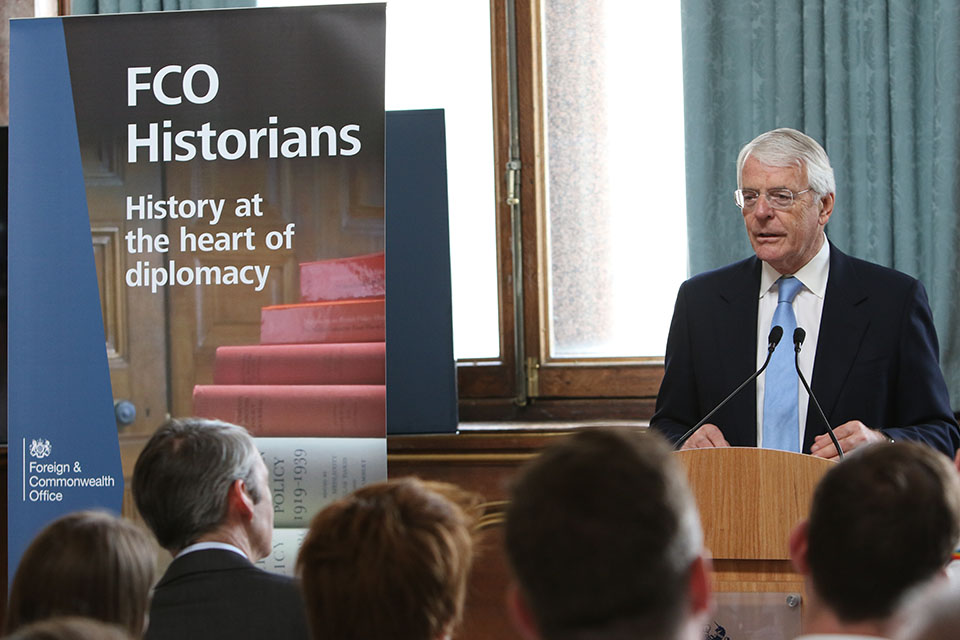Launching a New History Note
This year marked the 50-year anniversary of the partial decriminalisation of homosexuality in Britain and 26 years since the lifting of the bar on gay men and lesbians working for the British Diplomatic Service. During the summer FCO Historians launched Homosexuality at the Foreign Office, 1967-1991 (a ‘History Note’ based on my PhD research into social diversity at the FCO) with an event in the Locarno Suite, in which politicians, diplomats and activists gave personal insights into the ban, its lifting and what it is to be gay and work for the FCO.
Opening the event, Sir John Major, the Prime Minister who lifted the bar, reflected on the progress of the gay rights movement in his lifetime:
Many gay men and women have shaped our history, our literature and our social attitudes. Consider one example only from the not too distant past: consider Alan Turing, without whom the Enigma code might never have been broken, the Second World War might not have been won so speedily, and many more lives would have been lost in the winning of it. And yet, and yet, despite his extraordinary service to our nation, he was treated abominably after the Second World War. I truly believe that could not happen today, and I rejoice in that change.
I think that Major’s remarks identify an important lesson for today’s FCO about diversity: if we exclude different types of people, we also exclude different types of talent. If there’s one thing I’ve learned while studying the history of diversity at the FCO, it’s that organisations are at their best when trust and tolerance prevail over bigotry and short-sightedness. And, as John Kittmer pointed out: ‘We should not be complacent … We should remind ourselves of our history’.
Until 1991, the Diplomatic Service barred gay men and lesbians from representing Britain overseas. Officials thought that while same-sex relationships were considered socially unacceptable the risk of blackmail was too high to allow anybody other than heterosexuals into the service. As the History Note makes clear, however, policy files indicate that there was much more to the bar than fear of blackmail.
The History of the Bar on Homosexuality
The bar had been in operation since 1967, when Roy Jenkins guided the Sexual Offences Act through Parliament. Following the passing of the Act, diplomats at the Foreign Office worried that the social climate in Britain was such that gay men would go to great lengths to prevent being ‘outed’, and so were vulnerable to blackmail. The defection of homosexual officer Guy Burgess to the Soviet Union in 1951, as well as the homosexual honey trap to which John Vassall fell victim until his arrest in 1962, left British diplomats in no mood to court further sexual scandal. At the launch, Sir Stephen Wall recalled that life after decriminalisation was far from easy:
The nature of the law was actually very restrictive. Homosexual acts in private meant two people in a private house. If you were upstairs in the bedroom having sex and there was somebody in the kitchen, then you were committing an illegal act. If you went to a hotel, you were committing an illegal act. The impact of the law was actually to increase the persecution and prosecution of gay men.
By the 1970s, however, the gay rights movement was growing in size and stature, and consequently more pressure was applied on the Foreign Office to lift its bar. The Campaign for Homosexual Equality was particularly effective on challenging the logic of its position, while policy files from the period reveal the increasing difficulty with which the Personnel Department was able to deal with suspected cases of homosexuality. Fiona Graph, a long-time FLAGG activist who still works for the FCO, talked about the ‘endless minutes, discussions, meetings, drafts of letters, and very suspect and inaccurate statistics being used’ to try to uphold the ban. As gay men became more confident to be open about their sexuality, it became more difficult to sustain the argument that they were at risk of being blackmailed.

An event in the Locarno Suite, in which politicians, diplomats and activists gave personal insights into the ban, its lifting and what it is to be gay and work for the FCO.
During the 1980s, there was a ratcheting-up of rhetoric consistent with the political atmosphere of the period. Lord Cashman remembered the antagonistic atmosphere faced by gay rights campaigners of the 1980s:
At that time the tabloids could use clarion calls in their opposition to equality. AIDS and HIV had been with us in 1991 for approximately six years and was depicted amongst certain political arenas and in the tabloids and elsewhere as ‘the gay plague’. Gay men were accused of swirling around in a cesspit of their own making.
Despite these obstacles, however, internal pressure from unions, combined with external pressure from the media and campaign groups, was too strong to resist. Cashman explained that the clinching moment came when Sir Ian McKellen, the actor and gay rights campaigner, paid a personal visit to the Prime Minister to discuss the bar. As McKellen left, Major told him: ‘I will make absolutely certain that senior civil servants know about this, and I will see what I can do’. In July 1991, Major announced that owing to ‘changing social attitudes’ gay men and lesbians would be allowed to join the British Diplomatic Service for the first time.
Further Reading
Homosexuality at the Foreign Office, 1967-1991 and the full transcript from the event can be found at www.issuu.com/fcohistorians.
Keep tabs on the past.Sign up for our email alerts.
